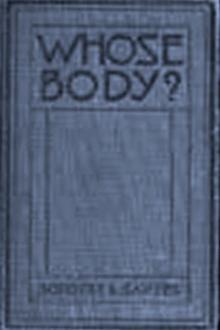Whose Body? A Lord Peter Wimsey Novel by Dorothy L. Sayers (book suggestions .txt) 📗

- Author: Dorothy L. Sayers
Book online «Whose Body? A Lord Peter Wimsey Novel by Dorothy L. Sayers (book suggestions .txt) 📗». Author Dorothy L. Sayers
As soon as the Stock Exchange opened I telephoned my various brokers, and by exercising a little care, was able to sell out the greater part of my Peruvian stock on a rising market. Towards the end of the day, however, buyers became rather unsettled as a result of Levy’s death, and in the end I did not make more than a few hundreds by the transaction.
Trusting I have now made clear to you any point which you may have found obscure, and with congratulations on the good fortune and perspicacity which have enabled you to defeat me, I remain, with kind remembrances to your mother,
Yours very truly,
Julian Freke
Post-Scriptum: My will is made, leaving my money to St. Luke’s Hospital, and bequeathing my body to the same institution for dissection. I feel sure that my brain will be of interest to the scientific world. As I shall die by my own hand, I imagine that there 251 may be a little difficulty about this. Will you do me the favour, if you can, of seeing the persons concerned in the inquest, and obtaining that the brain is not damaged by an unskilful practitioner at the post-mortem, and that the body is disposed of according to my wish?
By the way, it may be of interest to you to know that I appreciated your motive in calling this afternoon. It conveyed a warning, and I am acting upon it in spite of the disastrous consequences to myself. I was pleased to realize that you had not underestimated my nerve and intelligence, and refused the injection. Had you submitted to it, you would, of course, never have reached home alive. No trace would have been left in your body of the injection, which consisted of a harmless preparation of strychnine, mixed with an almost unknown poison, for which there is at present no recognised test, a concentrated solution of sn—
At this point the manuscript broke off.
“Well, that’s all clear enough,” said Parker.
“Isn’t it queer?” said Lord Peter. “All that coolness, all those brains—and then he couldn’t resist writing a confession to show how clever he was, even to keep his head out of the noose.”
“And a very good thing for us,” said Inspector Sugg, “but Lord bless you, sir, these criminals are all alike.”
“Freke’s epitaph,” said Parker, when the Inspector had departed. “What next, Peter?” 252
“I shall now give a dinner party,” said Lord Peter, “to Mr. John P. Milligan and his secretary and to Messrs. Crimplesham and Wicks. I feel they deserve it for not having murdered Levy.”
“Well, don’t forget the Thippses,” said Mr. Parker.
“On no account,” said Lord Peter, “would I deprive myself of the pleasure of Mrs. Thipps’s company. Bunter!”
“My lord?”
“The Napoleon brandy.”
[A] This is the first Florence edition, 1481, by Niccolo di Lorenzo. Lord Peter’s collection of printed Dantes is worth inspection. It includes, besides the famous Aldine 8vo. of 1502, the Naples folio of 1477—“edizione rarissima,” according to Colomb. This copy has no history, and Mr. Parker’s private belief is that its present owner conveyed it away by stealth from somewhere or other. Lord Peter’s own account is that he “picked it up in a little place in the hills,” when making a walking-tour through Italy.
[B] Lord Peter’s wits were wool-gathering. The book is in the possession of Earl Spencer. The Brocklebury copy is incomplete, the last five signatures being altogether missing, but is unique in possessing the colophon.
[C] Apollonios Rhodios. Lorenzobodi Alopa. Firenze. 1496. (4to.) The excitement attendant on the solution of the Battersea Mystery did not prevent Lord Peter from securing this rare work before his departure for Corsica.
[D] Lord Peter was not without authority for his opinion: “With respect to the alleged motive, it is of great importance to see whether there was a motive for committing such a crime, or whether there was not, or whether there is an improbability of its having been committed so strong as not to be overpowered by positive evidence. But if there be any motive which can be assigned, I am bound to tell you that the inadequacy of that motive is of little importance. We know, from the experience of criminal courts, that atrocious crimes of this sort have been committed from very slight motives; not merely from malice and revenge, but to gain a small pecuniary advantage, and to drive off for a time pressing difficulties.”—L. C. J. Campbell, summing up in Reg. v. Palmer, Shorthand Report, p. 308 C. C. C., May, 1856, Sess. Pa. 5. (Italics mine. D. L. S.)
End of the Project Gutenberg EBook of Whose Body?, by Dorothy L. Sayers




Comments (0)